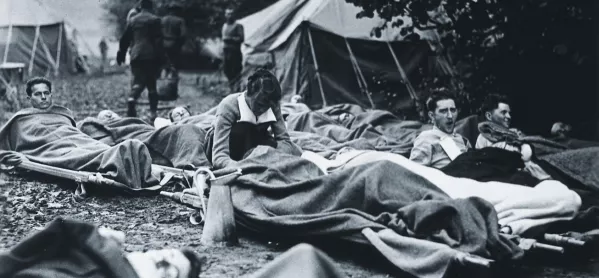As children and young people get used to being back in school, we must take stock of the impact that the Covid-19 lockdown had on them, of the disproportionate impact on certain vulnerable groups.
There’s an analogy with field hospitals. The field hospital takes care of casualties in easily accessible and highly visible buildings, they deal with immediate priorities and not peripheral data; schools, similarly, needs to deal with pupils’ Covid-19 lockdown “wounds”.
In a field hospital, the doctor knows it’s useless to discuss your cholesterol level or BMI when your wounds need immediate attention. For many of our children in schools - especially those with additional needs and others most affected by the closures - staff need to deal with the immediate impact of anxiety, with possibly traumatic lockdown experiences, with the impact of a lack of structure and routine over several months.
Back to school: School closures were ‘monumental’ for ASN children
Long read: Why school catch-up is a half-baked idea
A student’s view: ‘Covid-19 will make me treasure my last year at school’
We know that these mental wounds will manifest themselves in different ways. Some children will be withdrawn, others will act out and others may not come to school at all. Teachers and assistants may also be required to administer mental health first aid until the professional resources are available.
It is incumbent on us to make our schools the safest, happiest most structured places they can be, and to apply pressure for the proper resources to deal with mental health issues. There also needs to be a focus on relationships, on establishing (or re-establishing) routines and structures and increasing the use of restorative language. Commands to “just calm down” never work, so try “how can I help you?”; instead of “what did you do?”, ask that disruptive pupil “what happened?”.
We know that the impact of Covid-19 will be felt disproportionately by children and young people who live in poverty, who live with domestic violence, who have caring responsibilities and who have a disability or an additional support need. A key finding in a recent report by the Child Poverty Action Group (CPAG) was that parents said their primary concern as schools reopened was their children’s wellbeing. As primary school leader Susan Ward said in Tes Scotland last week, the expectation that schools can catch up on all lost teaching hours is unrealistic - the focus, instead, should be on wellbeing.
So, the return to school should be welcomed by all involved in the care and welfare of children and young people. But we need to find a balance between establishing a sense of “normal” - bringing back much-missed structure and routine - and identifying and dealing with the immediate needs of those most affected by the crisis. These approaches will be challenging at times, but they will pay dividends. They will certainly help pupils thrive and survive post-lockdown - far more so than any testing regime designed to measure what they missed.
A final thought: children, young people, teachers and families will tell you that they missed people. They missed their friends, their teachers, the lollipop man, the dinner lady and the jannie - school is about so much more than attainment levels.
Isabelle Boyd is an education consultant who formerly worked as a secondary headteacher and local authority assistant chief executive in Scotland. She tweets @isaboyd





